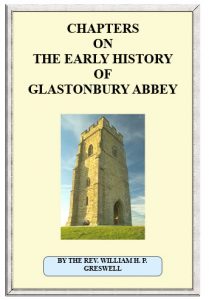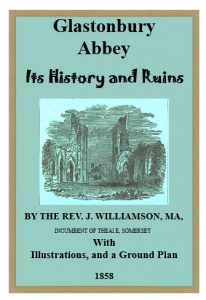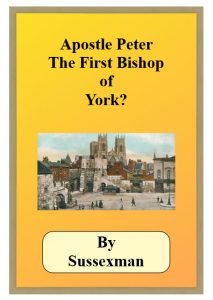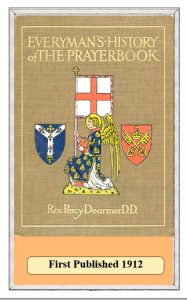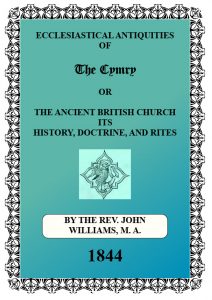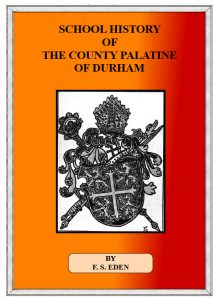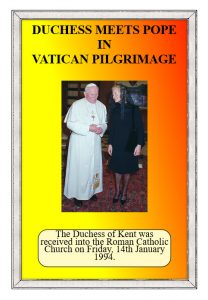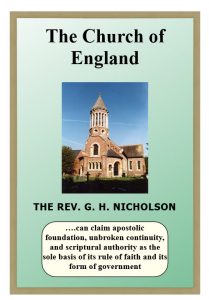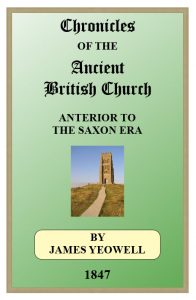OVER EIGHTY YEARS ago there took place in the city of Dublin the infamous Easter Rebellion. Members of the Irish Republican Army and the Marxist Citizen Army knowing that the British Army was involved in a life-and-death struggle with Germany in the Great War, seized the General Post Office and surrounding area in Central Dublin and proclaimed an “Irish Republic”. What is not so well known and what in this ecumenical age has become suppressed history, is the fact that the Irish Republican revolutionaries and murderers had received the Papal Blessing on their actions. For the aim, then as now in the 1990’s was to create an all-Ireland state with Roman Catholicism as the State Religion.
Download Category: Other Church
Chapters on The Early History of Glastonbury
IN MAKING A SHORT CONTRIBUTION TO THE EARLY HISTORY OF GLASTONBURY ABBEY I feel that I need offer no apology, as the old Tor itself, although 20 or 25 miles distant as the crow flies, is visible from my windows, and invites the attempt. More often than not it is draped in the mists that sweep up the Severn Sea from the north-west and lies half hid in the mirage of the moorlands. To write about the birth of Glastonbury is to write about a creation that has sprung from the sea, that has grown up silently in the weird marshes and meres of the “sea-moor-saetas,” and that loves to entangle itself in the magic mists of antiquity. Must we always adhere to the litcra scripta in speaking of Glastonbury? It is the land of legend, romantic figures, and shadowy heroes, and there is sometimes more substance to be found in these, especially when place names, topography, dedications, and the consentanea vox of antiquity confirm them, than in the litera scripta of the monastic scriptorium, where the greatest efforts of the Benedictine pens were directed to invent, to simulate, and to forge, so that the detective genius of a Stubbs can hardly winnow the true record from the false. No, we must ransack many storehouses to know and understand this ancient Somerset monastery, not the least or most unimportant of them being those of memories and magic associations that sway men’s feelings and enlist their eternal sympathies. Unlike any other monastery it has handed down from the earliest times the record of a national faith and the lamp of Christian revelation dimmed at times by errors and obscured by the turmoil of national changes, still enduring, with vitality of its own, through British, Saxon, and Norman times. Occasionally we look through a mist and magnify accordingly, idealising what may have been commonplace, but the spirit of the place invites it. And so let it be!
Glastonbury Abbey its History and Ruins
THIS SMALL VOLUME is sent forth by its author, with the earnest hope that it may afford some little information concerning a spot most dear to the Antiquarian, and deeply interesting to many whom the facility of modern travelling annually conveys to behold these noble and celebrated Ruins.
Much of its material was originally delivered at Glastonbury in the form of a Lecture. And as some brief and truthful narrative of the Abbey was greatly needed and demanded, it was earnestly requested that it might be published as a sort of Historical Guide.
Yielding to these solicitations, although conscious of many defects, the writer is thereby released from any apology for publishing these memoranda, which might have been considerably extended, if the antiquated documents and charters belonging to Glastonbury Abbey had been incorporated. These curious and ancient records are reserved, together with the writings of John of Glaston, Eyton, and others, for a larger work.
Apostle Peter The First Bishop of York?
WAS THE APOSTLE PETER THE FIRST BISHOP OF YORK? Many will say of course not, he was the first Bishop of Rome! While the fact that he was never first Bishop of Rome has been satisfactorily proved from Scripture and extant records and documents, but up to now very few were aware that there is good evidence that the Apostle Peter was in fact the first Bishop of York!
This lost information has been brought to light by, until recently, the unpublished book of the late Comyns Beaumont, “The Great Deception”. Comyns Beaumont, in his book produces overwhelming evidence that Peter was York’s first bishop.
From the very beginning of the Christian area York was a major centre of the Christian Church in the Culdee tradition. At one time the Diocese of York extended all the way to the Isle of Man, to include all of Scotland and on to the capital of Norway.
Everyman’s History of The Prayer Book
THIS little book cannot claim to be either “high-church” or low-church.” It is written in the belief that both those party terms are becoming obsolete, and that the Churchman of the future will be content to be a faithful Christian, and an honest man, thinking highly of the Church and lowly of himself. The writer hopes, however, that it will be found to have a certain breadth, since one cannot have a real Catholicism without catholicity; and if there is a word in it which is not Evangelical, he would wish it withdrawn by this preface. He has kept in mind, throughout, the friendly cheer which comes to us in these happier days from our separated fellow-countrymen on the one side and from the Orthodox Churches of the East on the other ; nor has he been forgetful of the debt we owe both to the Roman Church of earlier days, which sent the Gospel to our Western Islands, and with it the service-books from which our own is so largely derived, and also
to the Lutheran and other Reformers, who won for us some part of our Christian freedom. “Excellent courage our fathers bore.” Only to those on each side he would plead that, if anything in these pages displeases them, they should remember the other side. Everyman’s History of the Prayer Book is written for Everyman; and, after all, the Master whom we are each trying to follow is above all our divisions, rebuking our uncharities, and blessing every step we take along that Gospel way which is narrow to us only because we come so far short of God’s infinite breadth.
Everyman’s History of the Prayer Book is for Everyman, endeavouring to present that amount of matter which Everyman ought to know something about. The author has already written a very small introduction to the subject, called The Prayer Book, What it is, and he has avoided repeating from that little work more than seemed necessary, so that it may be taken, with one or two pamphlets, as a manner of appendix, completing what he has tried to say.
Ecclesiastical Antiquities of The Cymry
THE PURPORT OF THE FOLLOWING PAGES is to exhibit, in one view, the various features of the ancient Church of Cymru during its metro-political existence. A work of this nature was always desirable, but the want of it was never, perhaps, so much felt as now, when ecclesiastical antiquities are so generally canvassed among Christians.
It is true that we are already in possession of several treatises relative to the religion of our Catholic ancestors; and the learned authors who bequeathed them to us ought not to be mentioned except in terms of respect and gratitude. Still we are free to confess that their researches are not of a form sufficiently systematical, plain, and comprehensive, to suit the cravings and capacities of the ordinary reader. Subjects of main interest only, such as the origin, government, or independence of the Church, have been expressly investigated, whilst particulars, apparently of minor importance, have been left wholly untouched, or but incidentally and subserviently noticed.
Some of the writers may have conducted themselves also more as advocates in support of their respective positions, than as candid and impartial historians. Some have couched their facts and opinions in a language inaccessible to the community at large. And all have more or less confounded the character of the Cambrian with that of its sister Churches in the northern and southern provinces of Britain.
Further, those who have endeavoured to describe the historical progress of early Christianity in
the island, have either stopped with the mission of Augustine, or else deviated in an Anglican direction, overlooking afterwards not only the distinctive character, but even the very existence of the Church of Wales.
Hence it was necessary, that, whosoever wished to be fairly acquainted with any of its details, should cull his information, by a laborious process, from different and scattered fields. These considerations denote that the accounts which hitherto we have of the ancient British Church are far from complete. The present volume is therefore intended, not by any means to supersede them, but in some measure to supply their deficiencies, and that with especial reference to Cymru.
The Church of the Cymry is selected, not merely because former writers have delineated it less correctly than its neighbours, but rather inasmuch as it was the original, and therefore the legitimate communion of the land. For thus may be truly applied to that people as a Church, what was said of them as a nation: “No one has any right to the isle of Prydain but the tribe of the Cymry, for they first settled in it,” i.e. as Christians. Possessing the primary see, their archbishops could justly claim patriarchal jurisdiction over all the dioceses in the island.
School History of The County Palatine of Durham
MY objects in writing this little book are to contribute a modicum of help to the movement in favour of vacation schools and school. excursions which has become so marked a feature of recent educational development, and to further the study of local history as part of the school curriculum, so far as the regulations of the Board of Education, at present, admit.
It is, happily, unnecessary to expatiate upon the benefits, mental and physical, which may be reaped by our children (evidenced by the excellent results already attained) by the judicious use of vacation schools and school journeys and excursions, because the subject has been thoroughly dealt with in vol. xii; of the series of Special Reports on Educational Subjects, issued in 1907 by the Board of Education.
With regard to the study of local history, there are, I believe, two methods which, combined, may enable school authorities and teachers to get good results. A book dealing with the subject can be selected as the continuous reader, which, supplemented by reference to large scale map by the teacher’s own comments, will give the children a general idea of the history of the country round about them, and, perhaps, though this depends more on the teacher than on the book, they may gather a little enthusiasm for the subject and some desire to know more about it.
The notion that there are interesting things to be found out about the towns, villages, and countryside by looking into their past story, having thus got into the children’s minds, excursions, under the power given by the Board for a Limited number of outdoor lessons in the course of each year, may be made to places of interest within a few miles of the school. The result will be that the children, coming into actual contact with existing historical monuments, handling, seeing, sketching, and measuring them (for they should be encouraged to do all these; of course, to do them in intelligent fashion), will apply the ideas got from the book to the concrete objects before them; and the end of all education, the development of their powers of observation, of putting two and two together, of drawing inferences, of weighing evidence, will be greatly furthered.
The following pages cannot supply more than an outline sketch of Durham history, and, perhaps, I may be allowed to suggest that Durham teachers would find help in this work of teaching local history if they were to get a first-hand acquaintance with, by visiting, again and again, the ancient churches- and buildings in their immediate neighbourhoods, and were also to read such a book as Parker’s Introduction to Gothic Architecture, with his glossary of Gothic Architecture at hand for reference, and Boutell’s English Heraldry. Then they might go on to digest what is to be found in Surtees’ History of Durham and Billing’s Architectural Antiquities of Durham about the places visited.
Duchess Meets Pope in Vatican Pilgrimage
The picture on the front of this tract depicts the visit of the Duchess of Kent, to the Vatican. It is now twelve months since her Royal Highness became a convert to Rome. She was the first member of the Royal Family to do so.
This event, provoked some Roman Catholic Clergy to comment with some jubilation, that the Duchess of Kent’s conversion signalled the conversion of the British Throne back to Vatican Rule! They may be a little bit premature in their celebrations; But there is no doubt that there is a move in our Nation both Politically and Religiously, and this move is leading us back in to the Roman Fold.
Rome has a tradition that those who are non-Catholics and especially if they are women, that they must dress in black if they are having an audience with the Pope. This no doubt is to convey their inferiority to the Pope, who claims to be Christ’s earthly representative.
When anyone, whether they be Royalty or not, who submit to the authority of the Pope they are upholding one of the great errors of the Church of Rome; which is the Doctrine of Papal Infallibility and the Papal claims that the Pope is the Vicar of Christ. There is a clear lesson to be learned. No one can turn away from the truth without being engulfed in a greater error.
Papal Infallibility is not only unscripturable but it is also repugnant. But the claim that the Pope is Christ’s Vicar, is blasphemous. No one who has had a personal relationship with the Lord Jesus Christ and who is indwelt by the Holy Spirit, (who is the real Vicar of Christ) could ever countenance such a blasphemy.
We were all saddened by the Duchess of Kent’s conversion to Roman Catholicism; but when you consider the attitude of her former church; which was the Church of England, and the comments which emanate from its leaders. It is all too obvious that they have already one foot in Rome.
The Church of England
….can claim apostolic foundation, unbroken continuity, and scriptural authority as the sole basis of its rule of faith and its form of government
The Rev. G. H. Nicholson, Burghfield rectory, Nr. Reading, Berks, England
(The Burghfield Parish Church is on the cover of this publication)
Some Glimpses of its Earliest History may be gathered from. the words of the following GREAT AUTHORITIES IN BYGONE CENTURIES.
Tertullian. A.D. 155-222. The Church’s first great genius after the Apostles wrote “The extremities of Spain, the various parts of Gaul, the regions of Britain which have never been penetrated by Roman arms have received the religion of Christ.” (Tertullian Def. Fidel, p. 179).
Eusebius. A.D. 260-340. The Church’s first great historian, wrote: “The Apostles passed beyond the ocean to the isles called the Britannic Isles.” (De Demonstratione Evangelii, Lib. Ill).
St. Dorotheus. Bishop of Tyre. A.D. 303 said: “Aristobulus, whom Paul saluted writing to the Romans (Romans ch 16. v. 10) was Bishop of Britain” (Synopsis de Apostol. Synops 23 “Aristobulus”). He also mentions by name another Disciple as visiting Britain. Simon Zelotes preached Christ through all Mauretania, and Afric the less. At length he was crucified at Brittania, slain and buried.” (Synopsis de Apostol. Synops. 9. “Simon Zelotes.”)
Chronicles of The Ancient British Church Anterior to The Saxon Era
THE substance of the following work was originally published as miscellaneous papers in a monthly periodical during the year 1839, and collected at the close of the series as a separate tractate. The present republication has been suggested by the favourable reception and speedy sale of the first rough sketch already presented to the public. During those intervals of time when the writer has found himself released from other engagements, he has endeavoured, to the best of his ability, to gather up the precious fragments which remain in the works of historians of acknowledged authority respecting the primitive Church of Britain, that no part of so valuable a treasure might be lost. If nothing more has been effected than merely collecting and arranging the materials of our early Church history, and placing them in a light best calculated to convey instruction, it will be a satisfaction to have exerted even the feeblest effort.
The particular period of history discussed in the following pages is one of considerable interest to the ecclesiastical student, embracing as it does an account of the rise and progress of the infant Church of our country, and the triumphs of the faith over druidical mythology and Roman paganism. From the title of his work, it will be perceived that the writer has confined himself almost entirely to the Church history of this early period, and has only indirectly referred to its civil and political, with a view to illustrate its ecclesiastical affairs. Of the invasion of Britain under Julius Caesar, and again under Claudius—its struggles for liberty under Caractacus, Boadicea, and others— the rise of the British tyrants—the desertion of the island by the Romans—the irruption of the Picts and Scots—and the establishment of the Angles, Jutes, and Saxons, much has already appeared in the volumes of those who have written expressly on the civil and military transactions of Britain.
The origin and true nature of our social and political institutions must ever form a subject of peculiar interest for the study and reflection of every Englishman; but to the Christian who believes that the Church is the divinely appointed channel for conveying the precious gifts promised by God to his people, its introduction into his native land must be a matter of no common importance. He looks back on its earliest dawn with pleasing retrospection, watches its progress with intense solicitude, and at every step feels a personal interest in all the vicissitudes of its eventful history.

